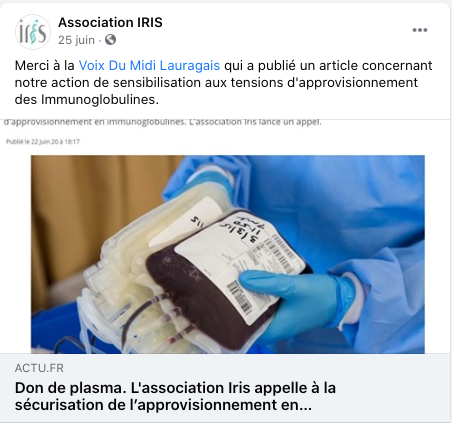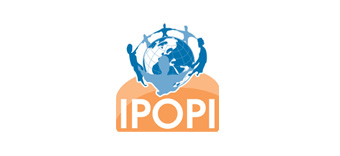October 03, 2020
FRANCE – an advocacy campaign by IRIS’ members targeting members of Parliament and health authorities
IRIS started fearing that COVID-19 would lead to a drop in plasma collection already in March and, sooner or later, to tensions in immunoglubulin supply. Before COVID -19 the situation was already difficult, especially with SubCutaneus IG, due to industry strategy of IG allocation in the country. Soon we noticed difficulties in some hospitals to meet demand due to a much larger than usal number of people moving from big cities to the country side at a time of the year when this was not expected.
We were lucky enough to be selected in a call for proposal run by Rhode Public Policy France (a consultancy agency), that offered pro bono consultancy for a campaign.
We therefore decided to launch a campaign, having our members as basis, to raise awareness among French Members of Parliament (MP) who, in general, are unaware of this issue, and among health authorities.
Our request? Adoption of a proactive approach by the French health authorities regarding IG supply tensions in France, aimed at protecting patients by removing the structural barriers related to plasma and IG supply.
How did we work? We had 3 webchats to present the whole operations to our board and regional delegates, then to our members. First, we had an educational approach to make them aware of the reality of the plasma sector in France, and the fact that they mainly rely on IG coming from abroad, if not totally, when it comes to subcutaneous IG (SCIG). Second, we were able to ask them if they would commit in writing to their local Members of Parliament, requesting an appointment and/or a written question to the Government.
We elaborated a set of tools to be used by us or by our members, comprising a document with extended key messages, the email to be sent to the MP, the draft of the written question, an open letter to the ministry of health (copied to the different national public health stakeholders) and co-signed by CEREDIH, our national reference centre, a press release, a set of posts for Facebook and Twitter, a folder with the details of all MPs (925), an online tool to follow up on the progress of the action and a campaign guide to explain the process.
As a result
We are considering to relaunch this campaign, as the threat for our patients remains. We are also very concerned with the patients who just got diagnosed; this situation can be difficult for patients diagnosed years ago but it can be even more complex for those recently diagnosed to have access to IG, especially SCIG.
Nevertheless, we were happy with the results of the first attempt. Many members were interested in learning more about how the system works, and happy to be able to commit, locally, at their level, based on their life experience.
We had a first meeting with the DG health, 76 MPs were contacted in 29 different parts of the country, 9 MPs tabled a written question, one wrote directly to the MoH and some of our members had appointments or advice on how to contact other influential people.
This was IRIS first attempt and results, in advocacy, do require time. But we could see that our members benefited from the experience, learnt more about the situation and were able to make their cases, which was a new exciting experience. With this said, we must continue!

